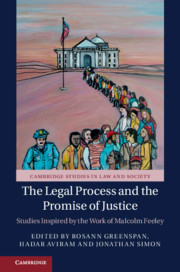Book contents
- The Legal Process and the Promise of Justice
- Cambridge Studies in Law and Society
- The Legal Process and the Promise of Justice
- Copyright page
- Contents
- About the Contributors
- Introduction: Past as Prologue
- Part I The Process Is the Punishment
- 1 Adversarial Bias and the Criminal Process: Infusing the Organizational Perspective on Criminal Courts with Insights from Behavioral Science
- 2 Malcolm Feeley’s Concept of Law
- 3 Process as Intergenerational Punishment
- 4 The Process Is the Problem
- Part II Court Reform on Trial
- Part III Judicial Policymaking and the Modern State
- Part IV Political Liberalism and the Legal Complex
- Index
- Books in the Series
- References
4 - The Process Is the Problem
from Part I - The Process Is the Punishment
Published online by Cambridge University Press: 18 April 2019
- The Legal Process and the Promise of Justice
- Cambridge Studies in Law and Society
- The Legal Process and the Promise of Justice
- Copyright page
- Contents
- About the Contributors
- Introduction: Past as Prologue
- Part I The Process Is the Punishment
- 1 Adversarial Bias and the Criminal Process: Infusing the Organizational Perspective on Criminal Courts with Insights from Behavioral Science
- 2 Malcolm Feeley’s Concept of Law
- 3 Process as Intergenerational Punishment
- 4 The Process Is the Problem
- Part II Court Reform on Trial
- Part III Judicial Policymaking and the Modern State
- Part IV Political Liberalism and the Legal Complex
- Index
- Books in the Series
- References
Summary
Malcolm Feeley’s pathbreaking book The Process Is the Punishment is a classic study of the gap between the law on the books and the law in action. In particular, Feeley exposes the tension between the ideal of “due process,” which seeks to allow individuals an opportunity to be heard at a meaningful time and in a meaningful manner, with the reality of how criminal processes and procedures impact a litigant navigating through the criminal justice process in powerful ways. Although due process protections in theory protect defendants and preserve the ideal of serving justice, they developed largely without regard to cost. Feeley’s book highlights the challenges and costs of invoking due process rights in various criminal settings.
- Type
- Chapter
- Information
- The Legal Process and the Promise of JusticeStudies Inspired by the Work of Malcolm Feeley, pp. 72 - 94Publisher: Cambridge University PressPrint publication year: 2019
References
References
Cases
Adickes v. S.H. Kress & Co., 398 U.S. 144 (1969).
Anderson v. Liberty Lobby, 477 U.S. 242 (1986).
Ashcroft v. Iqbal, 556 U.S. 662 (2009).
AT&T Mobility v. Concepcion, 563 U.S. 333 (2011)
Bell Atlantic Corp. v. Twombly, 550 U.S. 544 (2007).
Celotex Corp. v. Catrett, 477 U.S. 317 (1986).
Conley v. Gibson, 355 U.S. 41 (1957).
Epic Systems Corp. v. Lewis, 138 S. Ct. 1612 (2018).
Matsushita Electrical Industrial Corp. v. Zenith Radio, 475 U.S. 574 (1986).
Poller v. CBS, Inc., 368 U.S. 464 (1962).
Shearson/American Express, Inc. v. McMahon, 482 U.S. 220, 232 (1987).
Wal-Mart Stores, Inc. v. Dukes, 564 U.S. 338 (2011).
American Express Co. v. Italian Colors Restaurant, 570 U.S. 228 (2013).
Rules
Fed. R. Civ. Pro. Rule 1
Fed. R. Civ. Pro. Rule 8
Fed. R. Civ. Pro. Rule 23
Fed. R. Civ. Pro. Rule 26
Fed R. Civ. Pro. Rule 26(b)(1) 398 U.S. 977, 982 (1970) (amended 2000)
Statutes
Civil Code § 1793.22(c)



